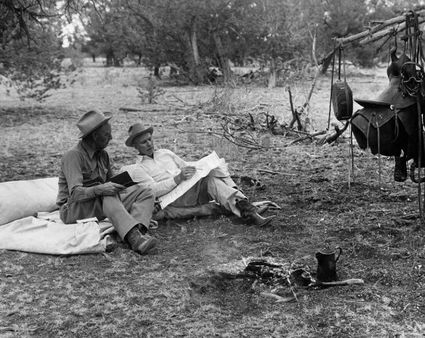South of the Border, Column No. 17:"Sweet Grass Hills Family Camp, 1979-1999"
June 12, 2019

This photo looking down on the 4-H Campground on Whitlash Road, shows the tent used to house the activities of the Sweet Grass Hills Family Camp during most of the camp's 21-year operation. The family camp, a nondenominational four-day annual event, provided worship, recreation and fellowship for campers. A local board of directors oversaw the annual camp and the camp was financed by a freewill offering.
South of the Border,
Column No. 17
Columnist's note: Several weeks ago someone asked if I'd heard of the Sweet Grass Hills Family Camp. They explained several local people were involved and that two members of Whitlash Presbyterian Church, Jeanette and the late Irvin Brown, were the folks who initiated the family camp. The camp was a four-day event that brought families together to worship, recreate and fellowship in a casual setting.
My wife and I attended a similar event in the mountains outside Saratoga, Wyoming in the mid-1980's. I tried to discover if there was an 'association' among these camps, to learn how they operated and to find if any were still functioning. Here's some of what I learned about a movement first described as "ranchers' family camps."
History of the Family Camp Movement
Rev. Ralph Hall and Rev. Roger Sherman, "missionary-clergymen," were directed by the United Presbyterian Church, USA, to "take the Gospel to people who cannot easily access a church." The missionaries created the Nogal Mesa Ranchman's Camp in New Mexico. It was 1940 and they hoped 50 people would attend the worship under a large tent. The first night they drew 125 attendees and the meetings continued to grow each night.
The missionaries developed a general program adaptable to any given area. The equipment needed to host a family camp (large tent, folding chairs, crates of hymnals, cooking equipment and eating utensils, toilet facilities, etc.) was owned by the Presbyterians and transported to each camp site. A local elected committee controlled when, where and how the camps were conducted. The camps were nondenominational.

A typical camp started on a Thursday evening and concluded after worship on the following Sunday morning. Families attending would sleep in tents, later RVs appeared. The local committee planned the event from the date and location to the daily schedule. Per missionaries Hall and Sherman the idea was always to "take the church to the people" and help isolated believers come together to "experience something of the larger fellowship of Jesus Christ."
The original camps started in the 1940's were generally designated as "Ranchers' Camp Meetings." Eventually the names included "family" to promote the idea there was something for every member of the family. In the mid-1950's Rev. Ray Nott became the director of the Northwest Camp program. He facilitated the start of the Seeley Lake family camp in 1962 and helped start the Sweet Grass Hills camp in 1979.
The Sweet Grass Hills Family Camp, 1979-1999
Toni Dafoe, a daughter of Jeanette and Irvin Brown, remembered attending the Seeley Lake family camp with her family. She said, "A couple of things stick in my mind about the camp. It was the first time I ever received Christian education from someone I didn't know. I knew everyone involved in the church in Whitlash who taught Sunday School or led youth activities." As Hall and Sherman hoped, the camp helped foster a sense of the "larger fellowship of Jesus Christ." Toni laughingly recalled, "They never chopped their firewood. They just laid logs across the fire and pushed them in as they burned. That would have been a hazard for grass fires in our area and it was strange to see as a kid."
Urban Kultgen, who served on the local board of directors for the Sweet Grass camp all during the camp's existence said, "Jeanette and Irvin called a meeting to discuss the possibilities of a family camp in our area. Those at the meeting liked the idea and we got going." The first year the camp was held in Brown's Gagnon Field on the west side of East Butte. Kultgen added, "We had no tent and the toilet facilities were crude, but we made it." For the next three years Rev. Nott provided the tent and other equipment. Nott retired in the mid-1980's and the Grace Gospel Church began providing the tent.
After several moves among area ranches, the family camp found a home at the 4-H Campground, on Whitlash Road, until the last camp was held. Like many of the other family camps, there were name changes: 1979-80 it was called the Agape Family Camp; 1981 the name was Sweetgrass Hills Family Ranch Camp and finally it was known as Sweet Grass Hills Family Camp.
Kultgen explained, "We schedule the camps to avoid conflicts with the regional fair because that would take youth and parents involved in 4-H. Usually we had the family camp the third week in July." Another issue affecting the date of the camp was the availability of the meeting tent and equipment.
There was a schedule each day, beginning with breakfast and ending with a campfire after the main worship service each evening. During the day there was Bible study, recreation and crafts for both kids and adults. For many families the camp was a 'vacation' from farm or ranch work so an afternoon nap might be the preferred activity. Several people fondly remembered "talent night" when campers entertained.
Interestingly there was no charge to attend the family camp, which included meals for the four-day event. Kultgen told, "We had a fish fry one of the nights during camp. The Board of Directors caught the fish for that meal. On steak night we asked diners to bring the cut of meat they wanted and we cooked it." Sunday morning, before the camp dispersed, there was a business meeting and the costs of the camp were reported. Then a freewill offering was taken. There was always enough money to cover the costs of the camp. One of the underlying principles of the camp program was "locally governed and financed."
An original "how to do family camp" publication stated, "...when the enthusiasm and need begin to wane, the camp will move on to another place." The Sweet Grass Hills Family Camp hosted its last camp in 1999, having a run of 21 years. Like many volunteer endeavors, the number of volunteers began to dwindle. Julia Dafoe, a granddaughter of the originators of the camp, said, "You have to remember that during the 1980's it was a tough time in agriculture. Lots of people left ranching and farming for economic reasons. Those who stayed took additional jobs off the farm or ranch to make ends meet. The pool of potential volunteers significantly decreased."

Rev. Ralph Hill and Roger Sherman, shown here in a 1950's photo, are credited with bringing family camps to the Northwest. Supported by the United Presbyterian Church, U.S.A., they helped start the Nogal Mesa Ranchman's Camp in New Mexico in 1940, which is still in operation. Ralph Hall was once referred to as "Missionary to the Cowboys" for his passion to "bring the church to people who could not easily attend worship services."
Also, technology changed things. The family camps were opportunities to 'catch up on the news' but social media, better transportation and new community outlets likely contributed to declining interest in the family camps. As one long-time volunteer put it, "Those camps were a lot of work. It wasn't just the four days of cooking and hosting, but the weeks to get ready and the clean up that followed. Some folks just got tired." Every volunteer can relate to that fact.

